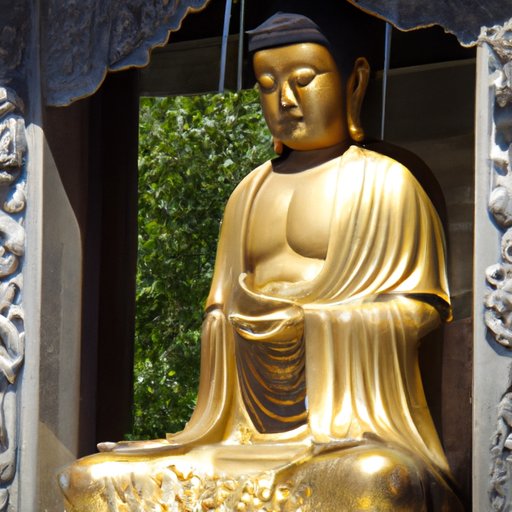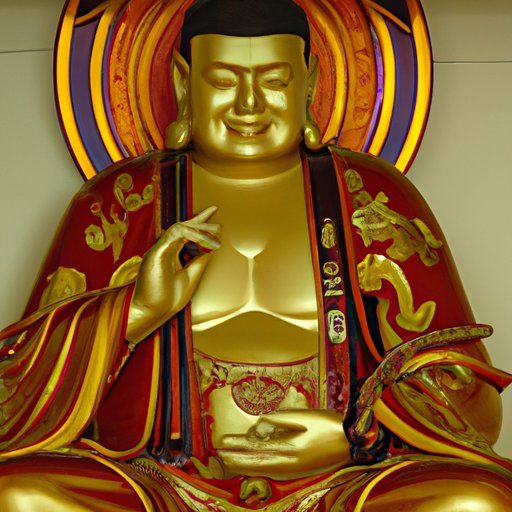Introduction
Buddhism is a religion and philosophical system founded by Siddhartha Gautama, an Indian prince who became known as the Buddha. It is based on his teachings and belief that all suffering can be alleviated through spiritual enlightenment and the practice of compassion and morality. Buddhism has had a profound impact on Chinese culture, influencing its language, literature, art, architecture, rituals, philosophy, politics, and government, as well as its medical and healing practices. This article will explore how Buddhism has affected Chinese culture throughout history.

Impact of Buddhism on the Chinese Language and Literature
Buddhism’s influence on Chinese language and literature is evident in the synthesis of Buddhist themes in literary works. For instance, many Chinese poems depict the Buddhist concept of impermanence and the idea that everything is in a constant state of change and flux. Additionally, Chinese authors often use Buddhist terminology to convey their ideas, such as referring to life as a “dream” or an “illusion.” Such terms have become part of everyday language in China.
Buddhist Beliefs as Reflected in Chinese Art, Architecture, and Ritual Practices
Buddhism has also left its mark on Chinese art, architecture, and ritual practices. In artwork, Buddhist motifs such as the lotus flower, the wheel of life, and various Bodhisattvas (enlightened beings) are commonly used to symbolize spiritual enlightenment and compassion. In architecture, Buddhist imagery such as pagodas and stupas are common features, while ritual practices such as chanting, meditation, and prayer are also popular among Chinese Buddhists. These practices have been adopted by Chinese people of all religions and serve as a reminder of the importance of Buddhism in Chinese culture.

Role of Buddhism in Chinese Philosophy
Buddhism has also had a significant influence on Chinese philosophy. Many traditional Chinese thinkers were inspired by Buddhist teachings and incorporated them into their own philosophies. For example, the concept of karma, which states that one’s actions will determine one’s fate, is an integral part of Chinese thought. Additionally, Buddhists have also used the teachings of the Buddha to interpret the teachings of Confucianism, creating a unique blend of these two philosophies.
Implications of Buddhism in Chinese Politics and Government
Buddhism has also had an effect on Chinese politics and government. During the Tang dynasty, Buddhism was seen as a powerful force for political reform and several Buddhist-inspired ideologies emerged. These included the notion of a “middle way” between competing factions and the idea of a “greater good” that should be sought after. Additionally, Buddhism has had a complex relationship with imperial rule, both helping to legitimize it and challenging its authority.
Buddhism’s Impact on Chinese Medicine and Healing Practices
Buddhism has also impacted Chinese medicine and healing practices. The principles of Buddhist thought have been used to explain the workings of the human body and the application of medicinal herbs. Additionally, Buddhist concepts such as the “three poisons” (greed, hatred, and ignorance) have been used to diagnose and treat various illnesses. Furthermore, Buddhist meditation and mindfulness practices have been used as a form of healing in Chinese medicine.

Comparison of Buddhism with Other Major Religious Traditions in China
It is important to note that Buddhism is not the only major religious tradition in China. Other major religious traditions include Daoism and Confucianism, both of which have also had a lasting impact on Chinese culture. While Buddhism emphasizes the importance of spiritual enlightenment and the practice of morality, Daoism focuses more on attaining harmony with nature and Confucianism emphasizes the importance of family and social obligations. As such, each of these traditions has its own unique set of beliefs and practices.
Conclusion
In conclusion, it is clear that Buddhism has had a profound influence on Chinese culture. From its impact on language and literature to its implications for politics and government, Buddhism has shaped Chinese culture in myriad ways. Additionally, it has provided a unique synthesis of traditional Chinese thought with Buddhist teachings and has served as a source of inspiration for Chinese art, architecture, and ritual practices. Finally, Buddhism has offered an alternative to the other major religious traditions in China, providing a distinct set of beliefs and practices.
(Note: Is this article not meeting your expectations? Do you have knowledge or insights to share? Unlock new opportunities and expand your reach by joining our authors team. Click Registration to join us and share your expertise with our readers.)
